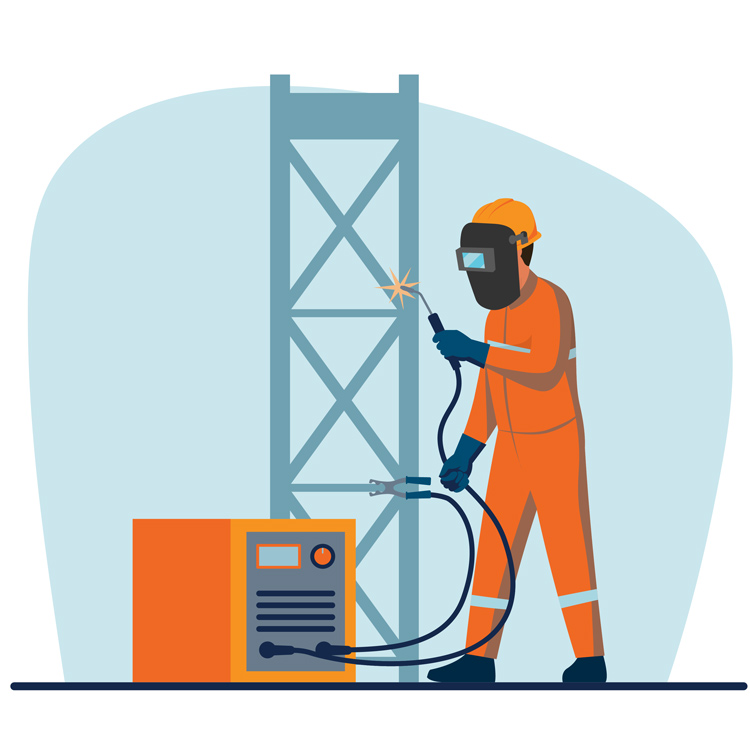Welding jobs near you can be found by searching online or contacting local companies directly. These jobs offer opportunities for skilled welders to showcase their expertise and contribute to various industries.
As the demand for welding services continues to grow, many businesses are actively seeking talented professionals to join their teams. Whether you are a seasoned welder or just starting your career, there are plenty of job openings available in your area.
By exploring job listings and networking within the welding community, you can discover exciting opportunities that match your skills and experience. Don’t miss out on the chance to secure a rewarding welding job near you and take the next step in your career.
Introduction To Welding Careers
Welding is a fundamental skill in various industries, making it an integral part of the manufacturing and construction sectors. As the demand for skilled welders continues to grow, pursuing a welding career presents numerous opportunities for job seekers. Whether you are an entry-level candidate or an experienced professional, the welding industry offers a range of benefits and a promising career path.
Growth Of Welding Industry
The welding industry is experiencing substantial growth, driven by the increasing demand for infrastructure and manufacturing projects. The construction of new buildings, bridges, and pipelines, coupled with the need for equipment repair and maintenance, has propelled the demand for skilled welders. This growth in demand is expected to create abundant job opportunities for individuals seeking to enter the welding profession.
Benefits Of Pursuing A Welding Career
- High Demand: The industry’s growth translates to a high demand for welders, ensuring a steady flow of job opportunities.
- Job Stability: Welding careers offer stability, as the need for skilled welders remains constant across various sectors.
- Lucrative Salaries: Skilled welders often earn competitive salaries, with the potential for increased earnings based on experience and expertise.
- Diverse Applications: Welding skills can be applied in a wide range of industries, providing opportunities for specialization and career growth.
Types Of Welding Jobs
Discover diverse welding jobs near you that offer hands-on opportunities in various industries. From structural welding to pipe welding, there are lucrative options available locally for skilled welders. Explore the exciting world of welding careers right in your area.
Types of Welding Jobs Welding is a skilled trade that requires precision and attention to detail. Welders play a crucial role in the construction and maintenance of buildings, bridges, and other infrastructure. Welding jobs can vary widely depending on the industry and specialty. In this article, we will explore the different types of welding jobs that are available, including commercial and industrial welding, underwater and aerospace welding, and custom fabrication and artistic welding.Commercial And Industrial Welding
Commercial and industrial welding involves working on large-scale projects such as bridges, skyscrapers, and power plants. This type of welding requires specialized knowledge and experience, as well as the ability to work with heavy machinery and equipment. Welders in this field must be able to read and interpret blueprints and work collaboratively with other tradespeople. Some common types of welding used in commercial and industrial projects include MIG welding, TIG welding, and Stick welding.Underwater And Aerospace Welding
Underwater and aerospace welding are two highly specialized areas of welding that require advanced training and expertise. Underwater welders work on offshore oil rigs, ships, and other underwater structures. This type of welding requires specialized equipment and training to work in the challenging underwater environment. Aerospace welding involves working on aircraft and spacecraft, including the construction of parts and components. This type of welding requires precision and attention to detail, as well as knowledge of the unique properties of aerospace materials.Custom Fabrication And Artistic Welding
Custom fabrication and artistic welding are two areas of welding that involve creating unique and customized pieces. Custom fabrication involves creating specialized parts and components for machinery or other structures. This type of welding requires creativity and problem-solving skills, as well as the ability to work with a variety of materials. Artistic welding involves creating sculptures, decorative pieces, and other works of art using welding techniques. This type of welding requires a high level of skill and creativity, as well as an eye for detail. In conclusion, welding jobs can vary widely depending on the industry and specialty. Whether you are interested in working on large-scale commercial projects, exploring the underwater world, or creating custom pieces, there is a welding job that is right for you. With the right training and experience, you can build a rewarding career as a welder.Required Skills For Welders
When it comes to welding jobs, possessing the necessary skills is crucial for success. From technical proficiency to physical stamina and safety knowledge, welders must meet specific requirements to excel in their roles.
Technical Proficiency In Welding Techniques
Welders must demonstrate expertise in various welding techniques such as MIG, TIG, and stick welding. They should be adept at reading and interpreting blueprints and technical drawings to ensure precision in their work.
Physical Stamina And Precision
Physical stamina is essential for welders, who often work in challenging environments. They must exhibit precision in their movements to create strong, durable welds that meet industry standards.
Safety Protocols And Certification
Adherence to safety protocols is non-negotiable in welding. Welders should possess relevant certifications, such as OSHA and AWS, to ensure they are well-versed in industry safety standards and practices.
Educational Pathways
Embarking on a career in welding involves various educational pathways that can lead to rewarding opportunities in the field.
Welding Certification Programs
Earning a welding certification from an accredited program enhances skills and employability.
- Hands-on training in welding techniques
- Understanding of safety protocols
- Qualifications for specialized positions
Apprenticeships And On-the-job Training
Apprenticeships and on-the-job training provide practical experience and mentorship.
- Hands-on learning in real-world settings
- Guidance from experienced professionals
- Opportunities to hone welding skills
Advancing With Specialized Courses
Specialized courses offer advanced training in specific welding techniques and technologies.
- Advanced welding processes
- Certifications in specialized areas
- Enhanced expertise for complex projects
Finding Welding Jobs Locally
Discover lucrative welding jobs near me effortlessly with local job listings. Find exciting opportunities to kickstart your welding career.
Job Search Strategies
Looking for welding jobs locally? Consider job search strategies like attending career fairs and applying in person.Networking And Industry Connections
Networking is key to finding welding jobs. Make industry connections through professional organizations and LinkedIn.Utilizing Job Boards And Trade Schools
Explore job boards like Indeed and Monster. Consider trade schools for training and job placement assistance.
Credit: www.thefabricator.com
Salary Expectations And Progression
When it comes to considering a career in welding, it’s essential to understand the salary expectations and career progression. From entry-level wages to experienced welders, the impact of location on pay, and long-term career growth, there are various factors that play a significant role in determining a welder’s earning potential.
Entry-level Wages Vs. Experienced Welders
Entry-level welders typically start with a median wage of around $18 per hour, while experienced welders with advanced skills and certifications can earn upwards of $30 per hour. The experience, expertise, and the ability to work with specialized materials can significantly impact a welder’s earning potential. Additionally, welders who are proficient in multiple welding techniques, such as MIG, TIG, and stick welding, often command higher wages due to their versatility.
Impact Of Location On Pay
The geographical location also plays a crucial role in determining a welder’s salary. For instance, welders in urban areas may earn higher wages compared to those in rural areas due to the higher cost of living. Furthermore, states with a significant demand for welders, such as Texas, California, and Louisiana, often offer more competitive salaries to attract and retain skilled professionals. Therefore, it’s essential to consider the cost of living and demand for welders when evaluating potential income based on location.
Long-term Career Growth
Welding offers numerous opportunities for career advancement and long-term growth. Experienced welders can progress to supervisory or inspector roles, leading to increased responsibilities and higher salaries. Additionally, pursuing advanced certifications, such as Certified Welding Inspector (CWI) or Certified Welding Educator (CWE), can open doors to higher-paying positions and increased job security. With the growing demand for skilled welders across various industries, the long-term career prospects for welders are promising.
Emerging Technologies In Welding
Discover the latest advancements in welding technology revolutionizing the industry. Explore high-demand welding jobs near you.
Welding is a crucial aspect of the manufacturing and construction industries. With the advancements in technology, welding techniques have also evolved, resulting in increased efficiency and productivity. In this article, we will explore some of the emerging technologies in welding that are changing the face of the industry.Automation And Robotics
Automation and robotics have revolutionized the welding industry, leading to an increase in productivity and precision. Welding robots are designed to perform repetitive tasks with high accuracy, reducing the need for human intervention. This technology has also improved the safety of welders by reducing their exposure to hazardous materials and environments.Advanced Materials And Techniques
The use of advanced materials and techniques in welding has resulted in stronger and more durable welds. For instance, the use of laser welding technology has made it possible to weld materials that were previously considered impossible to join. Additionally, the development of hybrid welding techniques has allowed for the welding of dissimilar metals, resulting in stronger and more versatile welds.Staying Updated With Industry Trends
Staying up to date with industry trends is crucial for welders to remain relevant in the industry. Advancements in technology, changes in industry standards, and the introduction of new materials and techniques can significantly impact the welding industry. Therefore, welders must keep abreast of these changes to remain competitive in the job market. In conclusion, the welding industry has witnessed significant advancements in technology over the years. Automation and robotics, advanced materials and techniques, and staying updated with industry trends are some of the emerging technologies that are driving the industry forward. Welders who embrace these changes are likely to enjoy increased productivity, improved safety, and better job prospects.Success Stories
Success stories in the welding industry are a testament to the rewarding career opportunities available. Aspiring welders often seek inspiration from the journeys of professionals who have excelled in the field. From interviews with seasoned welders to remarkable career milestones, these success stories shed light on the possibilities within the welding profession.
Interviews With Professional Welders
Engaging with professional welders provides valuable insights into the industry. Their experiences, challenges, and triumphs offer a glimpse into the diverse paths that can lead to success in welding careers. These interviews serve as a source of inspiration for individuals looking to enter or advance in the welding field.
Case Studies: From Novice To Expert
Exploring case studies that document the progression of individuals from novice welders to accomplished experts is both enlightening and motivating. These real-life accounts showcase the transformative journey that individuals embark on as they hone their welding skills and knowledge. From initial struggles to notable achievements, these case studies offer a wealth of inspiration.
Inspirational Career Milestones
Celebrating the inspirational career milestones of welders highlights the potential for growth and fulfillment within the industry. From obtaining relevant certifications to securing coveted positions, these achievements serve as beacons of encouragement for those pursuing welding careers. Each milestone represents a significant accomplishment and underscores the possibilities for success in the welding profession.
Preparing For The Job Market
When it comes to preparing for the job market in the welding industry, it’s essential to build a strong portfolio, craft a compelling resume, and master the interview process. These steps will help you stand out to potential employers and increase your chances of landing the welding job you desire.
Building A Strong Portfolio
One of the most effective ways to showcase your welding skills and experience is by creating a strong portfolio. Your portfolio should include photographs and descriptions of projects you’ve worked on, highlighting your ability to work with various materials, welding techniques, and project scales. Including before-and-after photos can demonstrate your problem-solving skills and attention to detail.
Resume Tips For Welders
When crafting your welding resume, be sure to highlight your relevant skills and experience prominently. Include any certifications, specialized training, and hands-on experience you possess. Use bullet points to make your achievements and qualifications stand out, and tailor your resume to each job application by emphasizing the skills and experiences that align with the specific job requirements.
Mastering The Interview Process
Mastering the interview process is crucial to securing a welding job. Prepare for common interview questions related to welding techniques, safety protocols, and problem-solving scenarios. Additionally, be ready to discuss specific projects you’ve worked on and the challenges you’ve overcome. Demonstrate your passion for welding and your ability to work well in a team, as well as independently.

Credit: jobs.crescentnews.com
Work-life Balance In Welding
Achieving a healthy work-life balance is crucial in the welding industry. Balancing long hours and physical demands with personal life can be challenging.
Managing Physical Demands
- Proper training and equipment help reduce physical strain in welding jobs.
- Regular breaks and stretching routines prevent injuries and fatigue.
Opportunities For Self-employment
- Self-employment in welding offers flexibility in work schedules.
- Entrepreneurial welders can choose projects and clients to balance work and personal life.
Community And Support Systems
- Joining welding associations provides networking opportunities and emotional support.
- Mentorship programs help welders navigate challenges and maintain a healthy work-life balance.

Credit: www.facebook.com
Frequently Asked Questions
Which Type Of Welding Pays The Most?
Underwater welding is one of the highest paying types of welding. It requires specialized skills and certifications.
Can Welders Make $100,000?
Yes, experienced welders can earn $100,000 or more annually due to high demand and specialized skills.
Are Welders Still High Demand?
Yes, welders are still in high demand in various industries including construction, manufacturing, and transportation. With the increasing need for infrastructure development and maintenance, skilled welders are essential for ensuring safety and quality in welding projects. The Bureau of Labor Statistics also predicts a steady growth in welding jobs in the coming years.
What Is The Highest Paid Welding Job Rig Welders?
Rig welders are among the highest paid in the welding industry due to the demanding and specialized nature of their work. Their expertise in welding and the challenging environments they work in make them highly sought after and well compensated.
Conclusion
As you search for welding jobs near you, remember the demand for skilled welders is high. Finding the right opportunity may be closer than you think. Stay updated on job listings and certifications to boost your career prospects. Start your welding journey today and watch your future shine bright.



